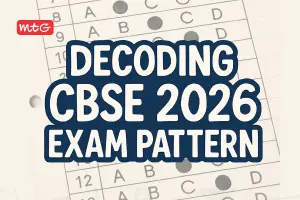Evolution Class 12 Biology MCQ with Answers has been organized according to the latest exam pattern in the CBSE Class 12 Biology syllabus for the upcoming CBSE Class 12 Biology Exam. Evolution covers topics like original of life and evolution of life forms, theories of evolution and population genetics, a brief account of evolution and human evolution., These questions are designed to help students understand the concept thoroughly. They are helpful for revision and for grasping the concepts effectively. The MCQ questions for Chapter 6 Evolution cover in-text book questions and important topics to help students assess their preparation level for CBSE board exams.
Recent – Molecular Basis of Inheritance Class 12 Biology MCQ With Solutions
CBSE Class 12 Chapter 6 Evolution MCQs
Check below the CBSE Class 12 Biology MCQ with answers and Clear your idea of Chapter 6 Evolution.
Q.1. A gene locus has two alleles A and a. If the frequency of dominant allele A is 0.4, then the frequency of homozygous dominant, heterozygous and homozygous recessive individuals in the population will be
(a) 0.16 (AA); 0.48 (Aa); 0.36 (aa)
(b) 0.16 (AA); 0.36 (Aa); 0.48 (aa)
(c) 0.36 (AA); 0.24 (Aa); 0.16 (aa)
d) 0.36 (AA); 0.48 (Aa); 0.36 (aa)
Answer
Applying Hardy-Weinberg equilibrium; p + q = 1
q = 1 – 0.4 = 0.6 ; p2 + q2 + 2pq = 1
Frequency of homozygous dominant genotype = p2
\ AA = (0.4)2 = 0.16
Frequency of heterozygous genotype = 2pq
\ Aa = 2 × 0.4 × 0.6 = 0.48
Frequency of homozygous recessive genotype = q2
\ aa = (0.6)2 = 0.36
Check Out – 11 Most Important Graphics of NCERT Class 12th Biology That You Cannot Miss
Q.2. Which of the following conditions is essential for a population to be in the Hardy-Weinberg equilibrium?
(a) Random mating (b) No gene flow
(c) No mutations (d) All of these
Answer
– the population is large enough and changes in allele frequencies due to chance or accident are insignificant.
– mating occurs at random.
– mutation does not occur or if it does occur it must reach a state of equilibrium.
– all the members of the population survive and have equal reproductive rates.
Hardy and Weinberg, through this law, have been able to explain why a population as a whole with all its variations and genotype frequencies continue to remain unchanged for many generations.
Practice More – CBSE Sample Paper Class 12 for 2023-24 Boards | FREE PDF from MTG
Q.3. Documented microfossils have been found that are as old as
(a) 2.5 billion years (b) 3.5 billion years
(c) 1.5 billion years (d) 2.5 million years.
Answer
(b)
Q.4. Mutation theory of Hugo de Vries was put forward while working on
(a) Drosophila
(b) Oenothera lamarckiana
(c) Rhesus monkey
(d) Ancon sheep.
Answer
Q.5. Who formulated that ‘ontogeny recapitulates phylogeny’ ?
(a) Darwin (b) Weismann
(c) Haeckel (d) Lamarck
Answer
Q.6. What did Miller and Urey use as a source of energy in their experiments?
(a) Actual lighting (b) An electrical spark
(c) UV light (d) Radioactivity
Answer
Q.7. Refer to the given graph and select the correct statement(s) regarding it.

(a) The population changes towards one particular direction in this selection.
(b) Evolution of DDT resistant mosquitoes is an example of this selection.
(c) Average sized individuals are favoured in this selection.
(d) Both (a) and (b).
Answer
Q.8. Presence of gills in the tadpole of frog indicates that
(a) fishes were amphibious in the past
(b) fishes evolved from frog-like ancestors
(c) frogs will have gills in future
(d) frogs evolved from gilled ancestors.
Answer
Q.9. Under certain conditions, scientists have got cell-like structures but without its true organisation. They are called
(a) protists (b) microbes
(c) coacervates (d) eobionts.
Answer
Q.10. Fossilisation is
(a) organisms destroyed by scavengers
(b) organisms eaten by predators
(c) organisms buried and preserved by natural process
(d) organisms destroyed by calamities.
Answer
We hope the MCQs for the CBSE Class 12 Biology Chapter 6 on Evolution are helpful for your board exam preparation.
Keep learning and stay updated with us for more CBSE exam updates.






























